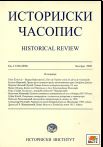Конзулат Краљевине Србије у Битољу (1889-1897)
Consulate of Kingdom of Serbia in Bitola (1889-1897)
Author(s): Slavenko TerzićSubject(s): History
Published by: Istorijski institut, Beograd
Keywords: Serbia; Bitola; General Consulate; Macedonia; Novaković; Bodi; Patriarchy; Bulgaria; Greek
Summary/Abstract: This paper discusses activities of the General Consulate of Kingdom of Serbia in Bitola since its establishment until the Greek-Turkish War in 1897. The article resumes all activities of the Serbian Consulate on the territory of vilayet (region) of Bitola concerning political, educational, cultural and church work in the frame of strategy of strengthening of Serbian national work in this part of Macedonia. Activities of the Consulate in Bitola had been part of wider and more organized action taken by Serbia in order to strengthen national work in Old Serbia and Macedonia. This action started with establishment of the Saint Sava Society (1886) and Serbian consulates in Skopje and Thessaloniki (1887) and later in Pristine and Bitola (1889). The main creator of Serbian national and cultural strategy toward Old Serbia and Macedonia was famous historian Stojan Novaković, Serbian representative in Constantinople (1886-1891) at the time. First consul was Dimitrije Bodi and vice-consul Petar Manojlović. This paper treats the most important information taken from their field reports regarding the conditions in Bitola and its region, as well as activities of Bulgarian, Greek and Romanian propaganda, as well as regarding intentions of the Serbian diplomacy to establish Serbian parishes, schools and to open Serbian libraries in the vilayet of Bitola. Because of lack of Serbian church organization in Turkey (after the abolishment of the Patriarchy of Peć in 1766), the main help in this line of work had been expected from the Patriarchy of Constantinople, but this institution was not ready to make any concessions without previous agreement of the governments in Belgrade and Athens regarding the limits of the spheres of interest in Macedonia. Serbian national work in the field had faced better organized work of the rival Balkan states, as well as the resistance of the big powers, mainly Austro-Hungarian and British diplomacy. Nevertheless, the first years of work of the Consulate had created the conditions for further liver and more successful Serbian educational, cultural and church activities among Serbian and generally Macedonian Slav population.
Journal: Историјски часопис
- Issue Year: 2008
- Issue No: 57
- Page Range: 327-342
- Page Count: 16
- Language: Serbian

